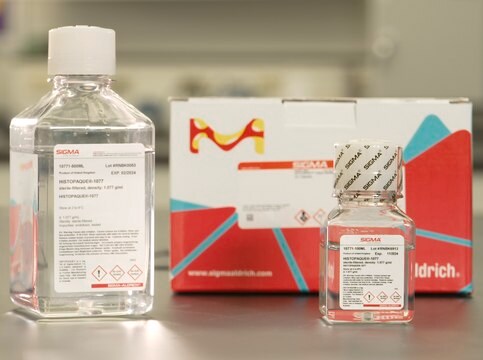11814389001
Roche
Red Blood Cell Lysis Buffer
solution, Roche, pkg of 100 mL, sufficient for 50-500 reactions
Synonym(s):
RBC Lysis Buffer, lysis buffer, red blood cells
Sign Into View Organizational & Contract Pricing
All Photos(1)
About This Item
UNSPSC Code:
23201100
Recommended Products
form
solution
usage
sufficient for 50-500 reactions
packaging
pkg of 100 mL
manufacturer/tradename
Roche
storage temp.
2-8°C
Related Categories
General description
Used for both DNA and RNA isolation, the buffer is designed for the preferential lysis of red blood cells from human whole blood, yielding intact white blood cells (free of red blood cells) for further applications. This buffer is not intended for use with whole blood from any other species.
Application
Red blood cell lysis buffer has been used in the isolation of PBMCs (peripheral blood mononuclear cells) from HIV infected patients. It has also been used in the isolation of lung cellsm, naive CD8+ T cells and infected cells from the lung.
Used for both DNA and RNA isolation, the buffer is designed for the preferential lysis of red blood cells from human whole blood, yielding intact white blood cells (free of red blood cells) for use in further research applications.
It has been used for the lysis of blood cells in femoral bone marrow, PBMC (peripheral blood mononuclear cells) and human lung adenocarcinoma samples.
It has been used for the lysis of blood cells in femoral bone marrow, PBMC (peripheral blood mononuclear cells) and human lung adenocarcinoma samples.
Physical form
Ready-to-use solution.
Other Notes
For life science research only. Not for use in diagnostic procedures.
WGK
nwg
Flash Point(F)
No data available
Flash Point(C)
No data available
Certificates of Analysis (COA)
Search for Certificates of Analysis (COA) by entering the products Lot/Batch Number. Lot and Batch Numbers can be found on a product’s label following the words ‘Lot’ or ‘Batch’.
Already Own This Product?
Find documentation for the products that you have recently purchased in the Document Library.
Customers Also Viewed
Jeroen J A van Kampen et al.
PloS one, 5(7), e11409-e11409 (2010-07-14)
HIV protease inhibitors must penetrate into cells to exert their action. Differences in the intracellular pharmacokinetics of these drugs may explain why some patients fail on therapy or suffer from drug toxicity. Yet, there is no information available on the
Ultra-Fast Analysis of Plasma and Intracellular Levels of HIV Protease Inhibitors in Children: A Clinical Application of MALDI Mass Spectrometry
Van Kampen JJ, et al.
PLoS ONE, 5(7), 11409-11409 (2010)
A virus-like particle vaccine candidate for influenza A virus based on multiple conserved antigens presented on hepatitis B tandem core particles
Ramirez A, et al.
Vaccine (2018)
Methylthioadenosine (MTA) Rescues Methylthioadenosine Phosphorylase (MTAP)-deficient tumors from purine synthesis inhibition in vivo via non-autonomous adenine supply.
Ruefli-Brasse A
Journal of Cancer Therapy (2011)
Quantification of membrane transporter proteins in human lung and immortalized cell lines using targeted quantitative proteomic analysis by isotope dilution nanoLC?MS/MS
Fallon JK, et al.
Journal of Pharmaceutical and Biomedical Analysis, 154, 150-157 (2018)
Our team of scientists has experience in all areas of research including Life Science, Material Science, Chemical Synthesis, Chromatography, Analytical and many others.
Contact Technical Service






